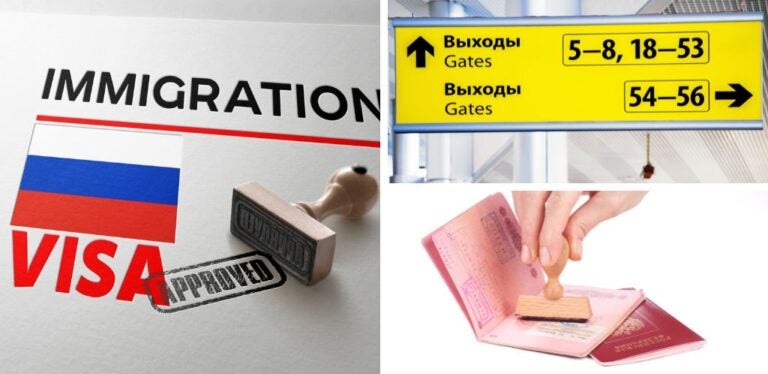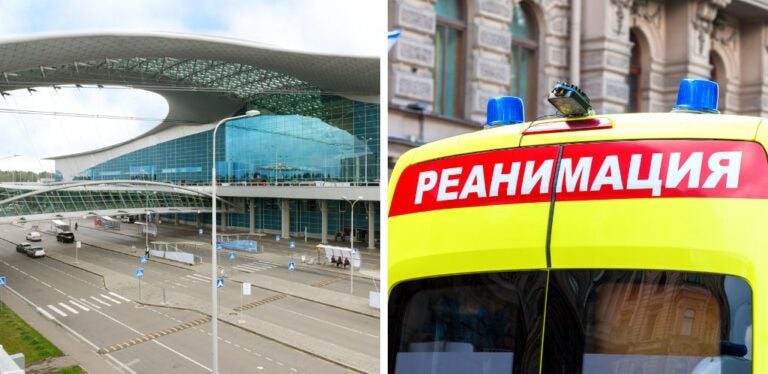Travel to Russia from Spain: Requirements you need to know
Do you want to know what are the requirements to travel to Russia from Spain in 2025? Find out if you need a visa or insurance. Be prepared!
Want to know the requirements to travel to Russia from Spain in 2025? Despite the current geopolitical situation and international restrictions, visiting the country is still possible. However, the Spanish Ministry of Foreign Affairs advises against it. If you’re planning a trip to explore places like Moscow or St. Petersburg anyway, make sure you’re well-prepared and have everything in order. Russian authorities are strict with tourists, and since 2023, fingerprint collection has been mandatory for both entry and exit.
We’ve put together a guide to help you sort out everything you need for your trip. Will you need a visa? Are there any mandatory vaccinations? Is travel insurance a must for all visitors? We’ve got the answers to these and other key questions. Plus, we’ll share some handy tips to make your stay smoother. Let’s dive in!
A tip for your trip to Russia
Before we get into the requirements to travel to Russia from Spain in 2025, here’s something to keep in mind. While it’s not a must, having a good internet connection from the moment you land can be a lifesaver. How will you navigate signs in Cyrillic? Have you thought about how you’ll handle your reservations or check in with family back home? It’s definitely something worth sorting out in advance.
If you’re taking a short trip—whether a few days or a couple of weeks—you might want to consider a Holafly eSIM for Russia. It gives you unlimited data starting at just 5,9 euros ($6,4), so you can stay connected without dealing with expensive international roaming fees or unreliable public Wi-Fi. Plus, you can choose exactly how many days you’ll need it when you purchase.
If you’re planning to stay longer, it’s worth checking out Holafly’s global internet plans. These renew automatically every month and start at 39,90 euros ($40,93). They’re also a great option if you’ll be traveling to multiple countries during your trip.
Important: If you are a frequent traveler and want to stay connected without worrying about expensive roaming or looking for a new SIM at every destination, Holafly’s subscription plans are for you. With a single eSIM, enjoy internet in more than 170 countries for a fixed price and no surprises on your bill. travel without limits and connect easily and securely! 🚀🌍

That said, now let’s start going over the requirements you will have to meet to be allowed to pass the control once you land in Russia.
1. Spanish passport
The first thing you’ll need to travel to Russia is a valid passport. Russian authorities are quite strict when it comes to identity documents, so make sure yours is in good condition. It shouldn’t have any torn pages, loose covers, or visible damage—otherwise, you could run into issues.
You’ll also need at least two blank pages in your passport for stamps and visas, and it must be valid for at least six months after your return date. Make sure your photo is up to date. If you renew your passport after getting a Russian visa, you’ll have to apply for a new one, as the old visa becomes invalid.
2. Tourist, residence or work visas for Russia
You’ll need a visa to travel to Russia from Spain, regardless of the purpose or length of your trip. Russian authorities are very strict about this requirement, so it’s crucial to choose the right type of visa and make sure everything is in order before you travel.
Since 2023, Russia has simplified immigration procedures with the introduction of a unified e-visa, but this is only available for short stays. If you’re planning to stay longer for work, study, or to live, you’ll need to apply for a specific visa.
- Tourist visa: For leisure trips, you can stay up to 30 days. Since August 2023, a unified e-visa is available, allowing stays of up to 16 days without the need to go to the embassy or consulate. You just have to fill out an online form, and it costs 52 euros ($56).
- Business visa: For trips related to meetings, business events, or commercial agreements, the visa can be valid for anywhere from 3 months to a year, depending on your application. It also allows multiple entries and exits from the country.
- Study visa: This is required for those planning to enroll in academic programs in Russia. Usually, universities provide an official invitation to help with the application. The visa’s duration depends on the length of the program and is typically renewed annually.
- Work visa: This is for those looking to work in Russia. The employer must arrange an official invitation and meet the immigration requirements. The visa’s duration will depend on the length of the employment contract.
- Temporary or permanent residence visa: This visa is for those wanting to live in Russia long-term. The process is more involved and requires additional documents, like proof of financial stability, a criminal record check, and a valid reason for staying.
It’s crucial to keep an eye on your visa’s expiration date. If it expires, you won’t be allowed to leave the country until you have a new one, and you also won’t be able to book a hotel room.
3. Address of accommodation in Russia and registration
When applying for your visa to enter Russia, you will be asked for an accommodation address. Please enter it when completing the online form.
For a short tourist trip, a confirmed hotel booking will do. In many cases, the hotel can give you an invitation letter to help with your visa application. If you’re traveling on a different type of visa, you’ll need to provide a permanent address in Russia.
If you’re staying in Russia for more than seven business days, you’ll need to register with the Federal Migration Service. Hotels usually handle this for you, but if you’re staying in a private apartment or house, your host—whether it’s a landlord or someone you know—will need to take care of the registration.
Please bring with you a printed copy of your accommodation reservation or letter of invitation. You may be asked for it upon arrival or even at checkpoints within the country.

4. Requirements to travel to Russia from Spain: medical insurance
To get a visa, you’ll need international health insurance—no exceptions. Without it, your visa won’t be approved. Russian authorities are strict about this requirement. Not just any insurance will do; it has to be from a provider that’s approved by companies with agreements in Russia. So, what are the requirements?
- Valid during your entire stay in Russia.
- Have a minimum coverage of 30,000 euros ($32,900) for medical assistance and hospitalization.
- Valid throughout the Russian territory.
Also, for student, work, or residency visas, you might need to meet additional requirements, like having repatriation coverage or coverage for specialized medical care.
It’s a good idea to always have both a printed and digital copy of your insurance policy with you. You might be asked for it at the airport or in private hospitals in case of an emergency.
5. Passing the immigration control
So, your documents are ready, and you’re about to head to Russia. What next? You’ll go through immigration control, which, as we’ve mentioned throughout the post, can be quite strict.
Starting in November 2024, all travelers will have their fingerprints taken when entering and leaving the country. Don’t be caught off guard when they ask you to place your fingers on a biometric scanner.
They’ll also request all the documents we’ve talked about and might ask you a few questions about your trip’s purpose or when you plan to leave. While a return ticket isn’t mandatory to travel to Russia from Spain, it’s smart to have one, as they might ask for it.
Once you’re cleared, you’ll receive an immigration card. It’s a small document that you need to keep with you throughout your stay. You’ll need it to register in the country and to leave without any issues. If you lose it, you’ll have to go through an extra process before being allowed to leave.
Other tips for traveling to Russia
That’s the main rundown of the mandatory requirements for traveling to Russia, but before we finish this guide, there are a few more things we want to mention. These aren’t things you’ll need to get through immigration, but they’re worth considering as you organize your trip. Helpful details that will make your stay more comfortable.
Before diving into the details, we want to stress again that the situation in Russia is quite delicate. You can take a look at our post, “Is it safe to travel to Russia?” for more information and the precautions you should take. Now, let’s get into what else you should know before you go.

1. Travel insurance for Russia
While having international health insurance is required for getting a visa, it’s also a good idea to get travel insurance. It will cover more than just your health; a solid policy will protect you against things like theft, lost luggage, cancellations, and unexpected legal issues or liability.
It’s worth noting that due to international sanctions on Russia, many Western insurers no longer offer coverage in the country. However, some companies, like Intermundial, still offer plans that you can purchase directly on their website.
2. Managing money in Russia
One of the biggest challenges you’ll face when arriving in Russia in 2025 is accessing money. Due to international sanctions, Visa, Mastercard, and American Express cards issued outside of Russia won’t work there. You won’t be able to use them to pay in stores or restaurants, or withdraw cash from ATMs.
The best option is to carry cash. You can exchange your dollars or euros at the Central Bank of the Russian Federation or at official exchange offices.
There is no limit to the entry and exit of foreign currency. However, you will have to declare amounts over $10,000 at customs.
3. Driver’s license
Thinking of renting a car in Russia? It’s a good idea to get informed beforehand. Driving in the country can be tricky, with tough road conditions, unpredictable weather, and strict rules. In big cities like Moscow or St. Petersburg, traffic is heavy, and there are many restrictions for private cars. It’s often easier to use public transport or taxi apps like Yandex Go.
If you still decide to go ahead, keep in mind that Russia recognizes foreign driver’s licenses, but they must be accompanied by an official translation into Russian and issued in the format of the 1968 Vienna Convention on Road Traffic. In other words, you’ll need to get an International Driving Permit before leaving Spain.
Before hitting the road, make sure to carefully read the recommendations on the Spanish Ministry of Foreign Affairs website. Not all regions in Russia are safe for tourists, and there are areas where it’s advised to avoid traveling altogether.
4. Recommended vaccinations to travel to Russia
There are no required vaccines for traveling to Russia from Spain in 2025. That said, it’s recommended to be up to date on vaccines for hepatitis A and B, tetanus, and diphtheria.
We recommend that you go to the international vaccination center that corresponds to you, where they will advise you on what to do.
Frequently asked questions on requirements for travel to Russia from Spain
Yes, all Spanish citizens need a visa to enter Russia, regardless of the reason for the trip. You can apply for a unified e-visa if your stay is up to 16 days, or a traditional visa if you plan to stay longer for tourism, study, work, or residency.
If you’re traveling with a standard tourist visa, you can stay in Russia for up to 30 days. With the unified e-visa, the maximum stay is 16 days. For longer stays, you’ll need a student, work, or residency visa.
It’s not a mandatory requirement, but immigration authorities may ask for it to make sure you’re not planning to overstay. Having a return ticket can help speed up the process at immigration.
Yes, you need medical insurance to travel to Russia from Spain. The policy must come from a provider that has an agreement with Russia, as many Western insurers have stopped offering coverage there due to international sanctions.
No, there are no mandatory vaccines for entering Russia. However, it’s recommended to be up to date on vaccines like hepatitis A and B, tetanus, and tick-borne encephalitis, especially if you plan to visit rural areas.





 Language
Language 


















 No results found
No results found



